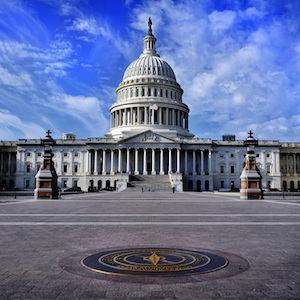
A markup by the House Financial Services Committee that started with numerous delaying tactics and accusations from each party that the other wasn’t acting in good faith ended more than 12 hours later with the approval of several bills—mostly along partisan lines. 
“Today, this Committee is being forced by the extreme MAGA wing of the Republican party to address a trove of anti-ESG, anti-investor, and wholly anti-capitalist bills…,” Rep. Maxine Waters (D-CA) said at the outset of the Committee’s markup, which began the morning of July 27 and didn’t end until around midnight.
Among the pieces of legislation (seven in all) approved by the committee were changes that seek to limit the influence of environmental, social and governance (ESG) initiatives, establish a regulatory framework for payment stablecoins, and protect self-custody for digital assets.
As part of the increasingly heated battle over ESG, the committee approved along a straight party-line vote of 29-21 H.R. 4767, the “Protecting Americans’ Retirement Savings from Politics Act,” offered by Rep. Bryan Steil (R-WI). This legislation, which is a culmination of 11 previously introduced bills, would address the shareholder proposal and proxy voting process. According to a summary released by the committee, it would raise resubmission thresholds for shareholder proposals, invalidate certain SEC regulations and guidance, limit the SEC’s ability to define a “major policy issue,” and permit companies to exclude ESG proposals from being considered.
Additionally, the bill seeks to provide “transparency and accountability” to the proxy advisory industry by, among other things, prohibiting so-called robo-voting, and requiring proxy advisory firm clients to issue annual public reports on their proxy voting. The bill would also require large asset managers to conduct economic analysis when voting against board recommendations and require investors to consent to the use of non-pecuniary factors in decision-making.
“The lack of transparency and accountability is putting Americans’ retirement savings at risk,” Rep. Bryan Steil (R-WI) stated in introducing his legislation on July 25. “Ensuring retirement and pension funds are being managed based on risks and returns, not political agendas, is a top priority. We need to empower investors, restore transparency and accountability, and enhance competition.”
Meanwhile, even after the heated debate, the Clarity for Payment Stablecoins Act of 2023 (H.R. 4766), introduced by Chairman Patrick McHenry (R-NC), which recognizes several regulatory paths for approving and regulating stablecoin issuers while establishing protections for consumers through federal guardrails, passed by a bipartisan vote.
Among the additional bills approved by the Committee included the following:
H.R. 4790, the “Guiding Uniform and Responsible Disclosure Requirements and Information Limits (GUARDRAIL) Act of 2023,” offered by Rep. Bill Huizenga (R-MI), would amend SEC disclosure regulations by “ensuring companies are only required to disclose material information and requiring the SEC to publicly list and explain any non-material disclosure demands.” It also establishes a Public Company Advisory Committee within the SEC to “enhance investor protection and market fairness.” The bill would also mandate an SEC study to assess the potential impact of the Corporate Sustainability Due Diligence Directive (CSDD) and Corporate Sustainability Reporting Directive (CSRD).
In short, the bill takes direct aim at a proposal released by the SEC in March 2022 that would require publicly traded companies to include certain climate-related disclosures in their registration statements and periodic reports.
“Since taking over at the SEC, Chair Gensler has seemingly done everything in this power to dismantle our capital markets,” Rep. Huizenga said in a statement upon introduction of the legislation. “Americans saving for retirement need less immaterial disclosure regulations that ultimately drive-up costs and reduce returns for everyday investors. The GUARDRAIL Act takes positive and deliberate steps to refocus the SEC on its core mission instead of pushing a political and social agenda."
H.R. 4655, the “Businesses Over Activists Act,” offered by Rep. Ralph Norman (R-SC), would clarify that the SEC does not have the power to regulate shareholder proposals through Rule 14a-8 and prevents the SEC from forcing companies to include or discuss shareholder proposals. Its goal, according to the committee, is to limit the SEC’s control in this area and emphasize the role of state regulations in governing shareholder proposals.
H.R. 4841, the “Keep Your Coins Act of 2023,” offered by Rep. Warren Davidson (R-OH), seeks to ensure that consumers are allowed to maintain custody of their digital assets in self-hosted wallets. This is a “key tenet” of blockchain technology because it allows consumers to avoid the risks associated with centralized, third-party custody. It also addresses one of the key risks identified by the FTX failure, the Committee notes.
These bills are now cleared for full consideration by the House of Representatives. While the bills may pass in the House, they face an uncertain future in the Senate, where Democrats still maintain control.
- Log in to post comments
